|
|
|
Sort Order |
|
|
|
Items / Page
|
|
|
|
|
|
|
| Srl | Item |
| 1 |
ID:
131958
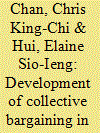

|
|
|
|
|
| Publication |
2014.
|
| Summary/Abstract |
2010 was a turbulent year for labour relations in China. The wave of strikes sparked by the Honda workers has highlighted the urgent need for trade union reform and workplace collective bargaining. In response to this turbulence, the Chinese government has stepped up efforts to promote the practice of collective bargaining, which had been neglected under the existing "individual rights-based" labour regulatory framework. In the midst of rapid social and policy changes, this article aims to examine the effect of labour strikes on the development of collective bargaining in China. The authors argue that, driven by growing labour protests, the collective negotiation process in China is undergoing a transition, from "collective consultation as a formality," through a stage of "collective bargaining by riot," and towards "party state-led collective bargaining." This transition, however, is unlikely to reach the stage of "worker-led collective bargaining" in the near future.
|
|
|
|
|
|
|
|
|
|
|
|
|
|
|
|
| 2 |
ID:
131947
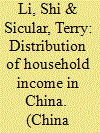

|
|
|
|
|
| Publication |
2014.
|
| Summary/Abstract |
Income Theory
Public Distribution
China
Chinese Economy
Poverty
Politics
Social Reforms
Inequality
Gini Sufficient
Household Survey
Distribution Theory
Distribution Politics
Development Strategy
International Standard
Urbanization
Urban Poverty
Rural Poverty
|
|
|
|
|
|
|
|
|
|
|
|
|
|
|
|
| 3 |
ID:
131950


|
|
|
|
|
| Publication |
2014.
|
| Summary/Abstract |
In a novel approach to studying political mobilization among ethnic Tibetans in China, this article addresses two key questions. First, considering the Chinese state's repressive policies towards Tibetan Buddhism, what role does religion play in fomenting Tibetan political resistance? Second, what implications can be drawn from the changing ethnic demography in Tibet about the conflict behaviour of Tibetans? Using various GIS-referenced data, this article specifically examines the 2008 Tibetan protest movements in China. The main results of our analysis indicate that the spread and frequency of protests in ethnic Tibetan areas are significantly associated with the number of officially registered Tibetan Buddhist sites, as well as the historical dominance of particular types of Tibetan religious sects. Furthermore, our analysis shows that the effect of Han Chinese settlement on Tibetan political activism is more controversial than previously though
|
|
|
|
|
|
|
|
|
|
|
|
|
|
|
|
| 4 |
ID:
131955
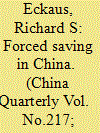

|
|
|
|
|
| Publication |
2014.
|
| Summary/Abstract |
The explanation offered here for the high rates of saving in China is that much of the saving has been "forced" in two Benthamite senses. Involuntary saving, the first of Bentham's meanings, includes taxes which finance investment. These have made up more than half of the total savings in China in recent years. There is also forced saving in China in the form of Bentham's second sense, conduced saving, resulting from bank loans which have financed investment. While the existence of a savings glut has been suggested for China, a better characterization would be that it has had a high rate of investment.
|
|
|
|
|
|
|
|
|
|
|
|
|
|
|
|
| 5 |
ID:
131951
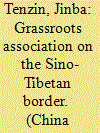

|
|
|
|
|
| Publication |
2014.
|
| Summary/Abstract |
This article investigates the role of the Moluo Tourism Association in Suopo township, Danba county, Sichuan. It examines its organization, internal structure and objectives, and explores the concerns of Tibetan elites and villagers and their strategies for advancing their political and other goals in an officially sanctioned framework. The research shows that the association resembles a "state-led civil society" as its membership and agendas exhibit the strong will of the local state; nevertheless, it still manages to carve a space for expressing negative opinions towards the local authorities, pursuing the "Eastern Queendom" cause and following its own agendas. The dynamic and nuanced interactions between the association and township show that state-society relations in China are situated in a complex and convoluted landscape which has not yet been fully explored in the China field. Furthermore, the article brings to light the divergent interests and positions of the association members as well as the heterogeneity of Suopo society proper. It concludes with a brief discussion of the prospects for an enhanced engagement of ethnic research with broader China studies.
|
|
|
|
|
|
|
|
|
|
|
|
|
|
|
|
| 6 |
ID:
131957


|
|
|
|
|
| Publication |
2014.
|
| Summary/Abstract |
Existing literature has long recognized that a partnership has been forged between the PRC government and Hong Kong's capitalist class. However, the implications of such a partnership for HKSAR governance have yet to be thoroughly explored. By examining the formation of this partnership and its consolidation after 1997, this article argues that the business sector's direct access to the sovereign state has fundamentally changed the dynamics of state-business relations in the HKSAR. As a consequence of the partnership between Beijing and the business sector, business elites have taken their concerns straight to the mainland authorities whenever they see their interests affected by the post-colonial state. This kind of circumvention has become a part of post-1997 politics, undermining the relative autonomy of the post-colonial state and resulting in growing cleavages within the state-business alliance during the first 15 years of the HKSAR. Whether and how such a partnership will evolve in the aftermath of the 2012 chief executive election remains to be seen.
|
|
|
|
|
|
|
|
|
|
|
|
|
|
|
|
| 7 |
ID:
131956
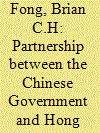

|
|
|
|
|
| Summary/Abstract |
Existing literature has long recognized that a partnership has been forged between the PRC government and Hong Kong's capitalist class. However, the implications of such a partnership for HKSAR governance have yet to be thoroughly explored. By examining the formation of this partnership and its consolidation after 1997, this article argues that the business sector's direct access to the sovereign state has fundamentally changed the dynamics of state-business relations in the HKSAR. As a consequence of the partnership between Beijing and the business sector, business elites have taken their concerns straight to the mainland authorities whenever they see their interests affected by the post-colonial state. This kind of circumvention has become a part of post-1997 politics, undermining the relative autonomy of the post-colonial state and resulting in growing cleavages within the state-business alliance during the first 15 years of the HKSAR. Whether and how such a partnership will evolve in the aftermath of the 2012 chief executive election remains to be seen.
|
|
|
|
|
|
|
|
|
|
|
|
|
|
|
|
| 8 |
ID:
131952
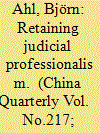

|
|
|
|
|
| Publication |
2014.
|
| Summary/Abstract |
In 2011 and 2012, the Supreme People's Court (SPC) published its first "guiding cases." Guiding cases serve as decision-making models that must be taken into account by lower courts when deciding similar cases. This study argues that the establishment of a national formal legal mechanism to improve consistency in adjudication across jurisdictions and geographical boundaries will strengthen judicial professionalism. The guiding cases system provides the SPC with an instrument to steer adjudication in lower courts discreetly, thereby allowing it to exercise significant influence over legal developments. Given the complexity of cases, compared to law set out in statute, non-lawyers may have tremendous difficulty in understanding and assessing the effects of guiding cases; this in turn acts as a protective mechanism against extra-legal interference. The reform is an example of the SPC's delicate manoeuvring in order to retain judicial professionalism in a hostile yet politically conservative environment. It reflects an attempt by the SPC to strengthen its position vis-à-vis other actors of the party-state and to consolidate the judiciary's function as an adjudicative institution that works on the basis of formal legal mechanisms.
|
|
|
|
|
|
|
|
|
|
|
|
|
|
|
|
| 9 |
ID:
131960


|
|
|
|
|
| Publication |
2014.
|
| Summary/Abstract |
This article looks at the changing frameworks for the institutional and cultural incorporation of second-generation rural migrants in Shanghai. Beginning in 2008, Shanghai launched a new policy of accepting migrant children into urban public schools at primary and secondary levels. I show that the hukou (household registration) is still a critical social boundary in educational institutions, shaping uneven distribution of educational resources and opportunities, as well as hierarchical recognition of differences between urbanites and migrants. I have coined the term "segmented incorporation" to characterize a new receiving context, in which systematic exclusion has given way to more subtle forms of institutional segmentation which reproduces cultural prejudice and reinforces group boundaries.
|
|
|
|
|
|
|
|
|
|
|
|
|
|
|
|
| 10 |
ID:
131954
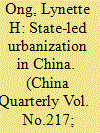

|
|
|
|
|
| Publication |
2014.
|
| Summary/Abstract |
This article examines the rationale behind municipal and local governments' pursuance of urbanization, and the political and socio-economic implications of the policy to move villagers from their farmland into apartment blocks in high-density resettlement areas, or "concentrated villages." It provides evidence of an increasing reliance by municipal and local governments on land revenues and the financing of urban infrastructure by the governments' land-leasing income. Following their relocation to apartment blocks, villagers complain that their incomes fall but their expenditures rise. Moreover, although they cede rights to the use of their farmland to the government, they are not given access to the state-provided social welfare to which urban residents are entitled. The paltry compensation which they receive for their land is insufficient to sustain them. Displaced or landless peasants are emerging as a distinctly disadvantaged societal group, deprived of the long-term security of either farmland or social welfare. The question of whether or not rural land rights should be freely traded is not as crucial to the future livelihoods of landless peasants as allowing them access to the full range of social welfare afforded to urban residents.
|
|
|
|
|
|
|
|
|
|
|
|
|
|
|
|
| 11 |
ID:
131953
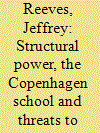

|
|
|
|
|
| Publication |
2014.
|
| Summary/Abstract |
This article engages with current debates surrounding China's security by employing the concept of structural power and the Copenhagen School approach to security studies to measure threats to China's security. Building on existing Chinese and English language research on China's security drivers, the article develops a mechanism for determining how China's economic relations with small states in Asia negatively affect their domestic stability and how this instability then loops back to undermine China's strategic position. The article uses China's relations with Cambodia, Nepal and Mongolia as case studies.
|
|
|
|
|
|
|
|
|
|
|
|
|
|
|
|
| 12 |
ID:
131949
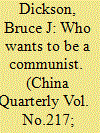

|
|
|
|
|
| Publication |
2014.
|
| Summary/Abstract |
This article analyses trends in the Chinese Communist Party's recruitment strategy and the composition of Party members. Based on original survey data, it analyses the motives for joining the CCP, the consequences on career mobility, and the effects of Party membership on political beliefs and behaviour in contemporary China. These data reveal three key findings. First, for those who aspire to positions in the Party/government bureaucracy or SOEs, Party membership is a necessary, if not sufficient, condition; for those in the non-state sector, it is youth and college education that are the keys to top jobs, and not Party membership. Second, CCP members are more likely to donate time, money, and even blood, for various causes, and to vote in local people's congress elections. This behaviour demonstrates mobilized loyalty: the CCP mobilizes its members to participate in these activities to demonstrate their loyalty to the regime and to serve as examples to the rest of the population. Third, Party members are not more likely to support and trust their state institutions: while they do have higher levels of support for the centre than the rest of population generally, Party membership does not produce increased support for the local state. Nor does economic development: all else being equal, support for central and local party-state institutions is lower in the most developed cities. These findings call into question the Party's recruitment and development policies, as well as the conventional wisdom on the link between economic development and popular support for the status quo.
|
|
|
|
|
|
|
|
|
|
|
|
|
|
|
|
|
|
|
|
|